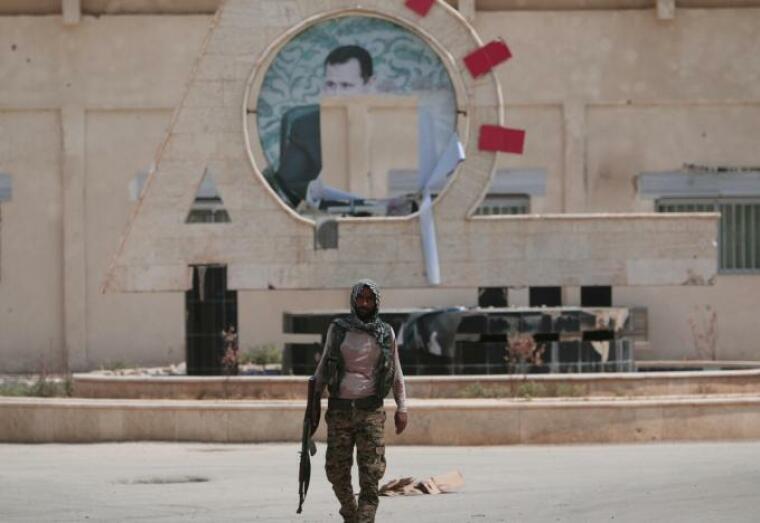Kurdish militia in Syria prevents Assyrian Christians from returning home

The villages previously inhabited by Assyrian Christians in north eastern Syria has been freed from ISIS but the Assyrians still cannot return home because the region is now under the control of Kurdish militia.
The Khabour River region was first attacked by ISIS in February 2015 affecting 35 Assyrian villages. Over 200 Assyrians were abducted but most of them were released after a ransom was paid.
According to World Watch Monitor, villages such as Tel Nasri and Tel Goran have been occupied by the Kurdish YPG militia (Yekîneyên Parastina Gel‎ or People's Defense Units) since 2015. It was initially believed that the militia was only there temporarily to train its forces and to prevent ISIS from retaking the villages.
Assyria TV has reported that the most affected village in the region was Abutina. Assyrian homes were reportedly destroyed by bombs and explosions from the YPG training.
The militia has allegedly been putting up warning signs in different parts of the village to scare away the Assyrians. It was also reported that the villages have been systematically looted by Kurdish groups.
Last month, Archbishop Jacques Behnan Hindo of the Syriac Catholic Church told Agenzia Fides that acts of violence are being carried out against Christians in the city of Hassake. He believed the acts were part of a strategy to expel the remaining Christians from the city.
"Whenever the Kurdish militia enter in action to reaffirm its military hegemony over the city, the epicenter of their raids and acts of force is always the area of the six churches, where most of the Christians live," said Hindo. "In many cases they expelled the Christians from their homes under the threat of Kalashnikovs. And where they enter, they loot everything," Hindo added.
Hindo said that he himself was a victim of intimidation when his house was fired upon. He suspected the Kurdish militias in the area because according to him, there were no other armed groups nearby.
"For sure, these shots were not fired by jihadists, whose closest bases were located more than twenty kilometers away," he added.
 Christians don't have to affirm transgenderism, but they can’t express that view at work: tribunal
Christians don't have to affirm transgenderism, but they can’t express that view at work: tribunal Archaeology discovery: Medieval Christian prayer beads found on Holy Island
Archaeology discovery: Medieval Christian prayer beads found on Holy Island Presbyterian Church in America votes to leave National Association of Evangelicals
Presbyterian Church in America votes to leave National Association of Evangelicals Over 50 killed in 'vile and satanic' attack at Nigerian church on Pentecost Sunday
Over 50 killed in 'vile and satanic' attack at Nigerian church on Pentecost Sunday Ukrainian Orthodox Church severs ties with Moscow over Patriarch Kirill's support for Putin's war
Ukrainian Orthodox Church severs ties with Moscow over Patriarch Kirill's support for Putin's war Islamic State kills 20 Nigerian Christians as revenge for US airstrike
Islamic State kills 20 Nigerian Christians as revenge for US airstrike Man who served 33 years in prison for murder leads inmates to Christ
Man who served 33 years in prison for murder leads inmates to Christ


 Nigerian student beaten to death, body burned over ‘blasphemous’ WhatsApp message
Nigerian student beaten to death, body burned over ‘blasphemous’ WhatsApp message 'A new low': World reacts after Hong Kong arrests 90-year-old Cardinal Joseph Zen
'A new low': World reacts after Hong Kong arrests 90-year-old Cardinal Joseph Zen Iran sentences Christian man to 10 years in prison for hosting house church worship gathering
Iran sentences Christian man to 10 years in prison for hosting house church worship gathering French Guyana: Pastor shot dead, church set on fire after meeting delegation of Evangelicals
French Guyana: Pastor shot dead, church set on fire after meeting delegation of Evangelicals ‘Talking Jesus’ report finds only 6% of UK adults identify as practicing Christians
‘Talking Jesus’ report finds only 6% of UK adults identify as practicing Christians Mission Eurasia ministry center blown up in Ukraine, hundreds of Bibles destroyed: 'God will provide'
Mission Eurasia ministry center blown up in Ukraine, hundreds of Bibles destroyed: 'God will provide' Church holds service for first time after ISIS desecrated it 8 years ago
Church holds service for first time after ISIS desecrated it 8 years ago Burger King apologizes for 'offensive campaign' using Jesus' words at the Last Supper
Burger King apologizes for 'offensive campaign' using Jesus' words at the Last Supper Uganda: Muslims abduct teacher, burn him inside mosque for praying in Christ’s name
Uganda: Muslims abduct teacher, burn him inside mosque for praying in Christ’s name